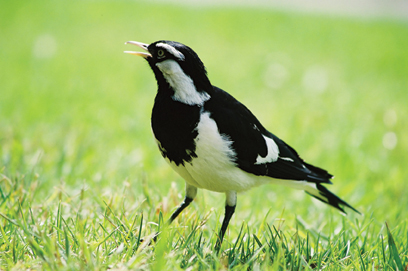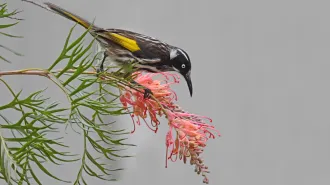Pairs of magpie-larks that duet with split-second timing are warning that they’ll really kick feathers if another bird attacks, according to new tests.

Recordings of precise duets alarmed other magpie-larks more than sloppy duets did, report Michelle Hall of the Max Planck Institute for Ornithology in Radolfzell, Germany and Robert Magrath of the Australian National University in Canberra. The researchers also found that longtime partners among magpie-larks tend to coordinate their singing better than new pairs do.
Duetting, usually by mated pairs, occurs in about 3 percent of known bird species (SN: 1/28/06, p. 58). Some observers say that Canada geese coordinate honks or that towhee mates give simultaneous squeaks. Other birds, especially those in the tropics, make remarkable music as mates take turns singing elements of a melody so smoothly that they trick a human ear into hearing a solo.
In Australia, pairs of magpie-larks (Grallina cyanoleuca) give ringing “pee-wee-pee-wee” duets. Either partner can start with a version of “pee-wee,” and the other bird usually repeats it. “They’re phenomenally precise,” says Magrath.
One magpie-lark’s part in a duet starts an average of half a second after its mate’s begins, the researchers say. During any duet, that lag time varies by only a few hundredths of a second. The researchers rated coordination during a duet by how small that variation was.
In a study of 32 pairs, Hall and Magrath found that newly paired males and females achieve peak coordination in less than half their duets during their first week. Pairs that stayed together for 2 or more years nailed the timing in about three-quarters of their duets. The duets got so precise that the researchers could detect the effect of distance between partners. The team reports its findings in the June 5 Current Biology.
Nigel Mann of the State University of New York at Oneonta, another researcher who studies duetting, welcomes the new work as “the first clear evidence” linking birds’ timing skill to the duration of their pairing. He says he had expected that trend, but at least three studies in other bird species have failed to find it.
The magpie-lark researchers played recordings to 12 pairs of birds on their territories, and males sang back as they do to trespassers. Research has established that a rising rate of male singing indicates perception of increased threat. A recording of a sloppy magpie-lark duet inspired 7 songs from the male in 5 minutes (for audio, click here). A tighter song inspired 9 songs, the researchers report (for audio, click here).
Mann says that he can think of several ways in which precision could sound threatening. It could indicate high motivation to defend a territory or it could indicate that a pair is fit and competent. It might even show that two birds are such competent foragers that they have the spare time to stay near each other and perfect their act.






